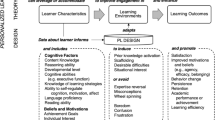Abstract
SOFTWARE SELECTION DECISIONS, especially when they involve sophisticated multimedia instructional courseware can be difficult for educators. Many confounding factors such as teachers’ inexperience with using instructional courseware and the emerging capability and sophistication of technology often make the evaluation and subsequent selection of courseware a challenging process.
In 1999, a study was conducted in which a panel of instructional technology experts rated the importance of 110 criteria statements to multimedia instructional courseware evaluation. The criteria could serve as a basis for constructing evaluative instruments useful for software screening. Participants completed an on-line World Wide Web (WWW) survey on three separate occasions or rounds over a two-month period. All communication between participants and the researchers was asynchronous through the Internet.
This paper describes the methods and materials used in the study. It discusses the criteria judged to be most important by the panel of experts and presents an analysis of their commentary, which was used to modify and refine the list of the highest-rated multimedia instructional courseware evaluation criteria.
Similar content being viewed by others
References
Bovée, C. L., & Thill, J. V. (2000).Business Communication Today. Upper Saddle River, NJ: Prentice Hall.
Ipek, I. (1999). Consideration for CBI screen design with respect to field dependence and computer window presentation type. In R. Griffin, W. Gibbs, & B. Wiegman (Eds.),Visual Literacy in an Information Age (pp. 159–166). Blacksburg, VA: International Visual Literacy Association.
Gagné, R.M., Briggs, L.J., & Wager, W.W. (1992).Principles of instructional design. Orlando, Fl: Harcourt Brace Jovanovich College Publishers.
Gros, B., & Spector, M. (1994). Evaluating automated instructional design systems: A complex problem.Educational Technology, 34(5), pp. 37–46.
Hannafin, M.J., & Peck, K.L. (1988).The design, development, and evaluation of instructional software. New York, NY: Macmillan.
Heinich, R., Molenda, M., Russell, J.D., & Smaldino, S.E. (1999).Instructional Media and Technologies for Learning. Columbus, Ohio: Merrill.
Heller, R. S. (1991). Evaluating software: A review of the options.Computer Educator, 17(4), 285–291.
Jolicoeur, K., & Berger, D.E. (1986). Do we really know what makes educational software effective? A call for empirical research on effectiveness.Educational Technology, 26(12), 7–11.
Jonassen, D.H., Peck, K.L., & Wilson, B.G. (1999).Learning with technology: A constructivist perspective. Columbus, OH: Merrill.
Linstone, H.A., & Turoff, M. (1975).The Delphi method: Techniques and applications. Reading, MA: Addison-Wesley Publishing Co.
Oswalt, B.J. (1982).Identification of competencies necessary for computer literacy and determination of emphasis placed on each competency in introduction to data processing courses offered at the high school level. Unpublished doctoral dissertation. Memphis State University.
Roblyer, M.D., Edwards, J., & Havriluk, M.A. (1997).Integrating educational technology into teaching. Columbus, Ohio: Merrill.
Sapre, P.M. (1990).Research Methods in Business Education. Little Rock, AR: Delta Pi Epsilon.
Schueckler, L.M., & Shuell, T.J. (1989).A comparison of software evaluation forms and reviews.Journal of Educational Computer Research, 5(1), 17–33.
Smeltzer, L.R., & Leonard, D.J. (1994).Managerial Communication. Boston, MA: Irwin McGraw-Hill.
Tolhurst, D. (1995). Hypertext, hypermedia, multimedia defined?Educational Technology, 35(2), 21–26.
Author information
Authors and Affiliations
Additional information
ABOUT THE AUTHORS William Gibbs is an Associate Professor and the Head of the Department of Media Services at Eastern Illinois University. He received his Ph.D. in Instructional Systems from The Pennsylvania State University. He has worked with individuals from various academic disciplines as part of instructional design teams and has served as instructional design and technology advisor to faculty in the development of instruction and instructional materials. For the past several years, he has offered educational technology courses via the Internet. His research interests include knowledge acquisition, technology-based learning environments, and methods for effective instructional software evaluation.
Pat R. Graves is a Professor in the School of Business at Eastern Illinois University, Charleston. She teaches business communications and computer-related courses. Her research interests include the visual display of information and computer-mediated communication. Also, she has been studying cognitive and affective aspects of learning, instructional design practices for interactive delivery, and issues associated with Internet-and Intranet-based distribution. She has given numerous conference presentations, published articles, and co-authored two books on the topic of presentations using computer technology. Dr. Graves is co-editor of theBusiness Education Index published by Delta Pi Epsilon, a graduate research association for business teacher educators.
Ronan S. Bernas is an Assistant Professor at the Department of Psychology of Eastern Illinois University. He received his Ph.D. in Psychology (Committee on Human Development) from the University of Chicago in 1995. His research is on argumentative and explanatory discourse. He examines the learning and conceptual changes that occur during argumentative and explanatory discourse.
Rights and permissions
About this article
Cite this article
Gibbs, W.J., Graves, P.R. & Bernas, R.S. Identifying important criteria for multimedia instructional courseware evaluation. J. Comput. High. Educ. 12, 84–106 (2000). https://doi.org/10.1007/BF03032715
Issue Date:
DOI: https://doi.org/10.1007/BF03032715




